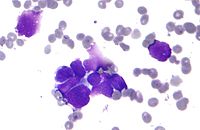
Photo from wikipedia
Simple Summary Cholangiocarcinoma, a tumor derived from epithelial cells of the biliary tree, is characterized by a dismal prognosis. Its late diagnosis, which makes surgical resection not an option for… Click to show full abstract
Simple Summary Cholangiocarcinoma, a tumor derived from epithelial cells of the biliary tree, is characterized by a dismal prognosis. Its late diagnosis, which makes surgical resection not an option for most patients, and its marked refractoriness to standard chemotherapy, justify its high position in the rank of the most lethal cancers. Identifying specific druggable genetic alterations constitutes a promising alternative for the use of personalized targeted anticancer agents, and immunotherapy, or drugs able to interact with proteins involved in the crosstalk between cancer and immune cells, could also be an option in the future. However, it has also been observed that some patients fail to respond to these new therapies or after an initial response, the disease progresses. Therefore, understanding the mechanisms of pharmacoresistance is of utmost importance to design more effective treatments. Abstract Despite the crucial advances in understanding the biology of cholangiocarcinoma (CCA) achieved during the last decade, very little of this knowledge has been translated into clinical practice. Thus, CCA prognosis is among the most dismal of solid tumors. The reason is the frequent late diagnosis of this form of cancer, which makes surgical removal of the tumor impossible, together with the poor response to standard chemotherapy and targeted therapy with inhibitors of tyrosine kinase receptors. The discovery of genetic alterations with an impact on the malignant characteristics of CCA, such as proliferation, invasiveness, and the ability to generate metastases, has led to envisage to treat these patients with selective inhibitors of mutated proteins. Moreover, the hope of developing new tools to improve the dismal outcome of patients with advanced CCA also includes the use of small molecules and antibodies able to interact with proteins involved in the crosstalk between cancer and immune cells with the aim of enhancing the immune system’s attack against the tumor. The lack of effect of these new therapies in some patients with CCA is associated with the ability of tumor cells to continuously adapt to the pharmacological pressure by developing different mechanisms of resistance. However, the available information about these mechanisms for the new drugs and how they evolve is still limited.
Journal Title: Cancers
Year Published: 2021
Link to full text (if available)
Share on Social Media: Sign Up to like & get
recommendations!